TSX.V : HI OTCQB: HDRSF
HIGHLAND COPPER ANNOUNCES PRELIMINARY ECONOMIC ASSESSMENT RESULTS FOR ITS WHITE PINE NORTH PROJECT AND JOINT VENTURE TRANSACTION WITH KINTERRA
Vancouver, Canada, July 24, 2023. Highland Copper Company Inc. (TSXV: HI; OTCQB: HDRSF) (“Highland” or the “Company”) is pleased to announce the results of the Preliminary Economic Assessment (“PEA”) and mineral resource estimate for the White Pine North project (“White Pine North”) in Michigan, USA. The PEA demonstrates the robust economic strength of this long-lived project.
Simultaneously, Highland is pleased to introduce Kinterra Copper USA LLC (“Kinterra”) as a joint venture (“JV”) partner on the project. Kinterra will bring additional financial and technical strength required to progress the project through to development. Kinterra has made a cash payment of $30 million to Highland for a 66% stake in the White Pine North project. Additionally, the joint venture has agreed to spend a further $30 million to advance the project through permitting, infill drilling and feasibility study.
Highland continues to make great progress in 2023. Combined, these announcements markedly improve Highland’s prospects of advancing its larger White Pine North project while focusing on moving its Copperwood project to construction and operation. Highland believes this is positive for all stakeholders, particularly the State of Michigan where Highland’s project development is aligned with the State vision of electrification and regional support for local communities.
Key highlights of the PEA and joint venture transaction include (all figures in $USD):
-
Robust PEA Results Set Path for White Pine North Advancement: With a significant increase in resource base, an after-tax net present value (“NPV”) 8% of $821 million and an after-tax internal rate of return (“IRR”) of 20.8%, the project provides strong cash flow and leverage to copper price.
-
Kinterra Invests $30 Million for 66% of White Pine North, Funds Available for Copperwood: The initial $30 million proceeds from the joint venture arrangement allow Highland to initiate early site works at the fully-permitted Copperwood project, where Highland is focused on advancing to development and production.
-
Additional $30 Million Commitment to Advance White Pine North Permitting and Feasibility Study: Kinterra and Highland, as JV partners, have agreed on a further $30 million investment in the project to be funded by Kinterra. This consists of $20 million representing Kinterra’s 66% pro rata expenditure, as well as a $10 million unsecured loan to fund Highland’s pro rata expenditure.
-
Highland Set to Advance Key Michigan Assets: With key assets 100% owned Copperwood, 34% owned White Pine North, a consolidated multi-billion pound resource base, and an additional $30 million in liquidity, Highland looks forward to contributing to critically needed US domestic copper supply through production growth with these advanced-stage projects.
“Today’s announcements are transformational for Highland Copper. While we continue to maintain our focus on the fully-permitted Copperwood project, we have a viable path to simultaneously advance the White Pine North project, keeping our focus on near-term value creation by creating a new US copper producer. As significant capital is required to develop both projects, the joint venture arrangement allows us to move forward without having to issue any shares, and unlocks tremendous value for our shareholders. Kinterra recognizes the quality of our asset base and is committed to working with Highland to advance White Pine North. We look forward to working with Kinterra as partners to progress this great asset.
We are pleased that all stakeholders, including the various Michigan communities and our shareholders, will benefit as we surface the significant asset value at both projects. We look forward to updating the market as we advance.” stated Denis Miville-Deschênes, President and CEO of Highland Copper.
Key Preliminary Economic Assessment Highlights1,2
The PEA provides a base case assessment of mining the mineral resources of the White Pine North Project. The PEA considers White Pine North as a stand-alone project, where potential synergies with Copperwood are not considered. The Project is the extension of the historical White Pine mine which operated from 1953 to 1995. The results of the White Pine North PEA demonstrate the long-lived nature of the project with strong economics and cash flows. Key highlights include the following, with all figures being shown for 100% of the asset:
-
Strong Economic Returns with Leverage to Copper Price Changes
◦ After-tax NPV8% of $821 million (at $4.00/pound copper price)3
◦ 20.8% after-tax IRR
◦ At $4.50/pound copper price, after tax NPV8% of $1.2 billion and IRR of 25.4%
-
Improved NPV to Initial Capital Expenditure Ratio
◦ Initial capital expenditures of $615 million, net of pre-production revenue of $265 million
◦ NPV to initial capital expenditure ratio of 1.33
-
Significantly Increased Resource Base
◦ Indicated mineral resource containing 3.5 billion pounds of copper (150.7 million tonnes at 1.05% Cu) and 65.5 million ounces of silver (13.5 g/t Ag)
◦ Inferred mineral resource containing 2.2 billion pounds of copper (96.4 million tonnes at 1.03% Cu) and 27.8 million ounces of silver (9.0 g/t Ag)
◦ From the above resource, mineralized material included in the mine plan of 115.8 million tonnes at 0.97% Cu and 11.09 g/t Ag, containing 2.47 billion pounds of copper and 41.3 million ounces of silver
-
Long-lived Asset with Strong Cash Flows
◦ Mine life of 21.8 years, including 21 months of ramp-up, with average annual LOM payable copper production of 93.5 million pounds and 1.2 million ounces of silver
◦ Life-of-mine (“LOM”) average C1 cash costs of $1.58/lb, net of by-product
◦ Undiscounted average annual operating cash flow of approximately $210 million and annual free cash flow of approximately $160 million (excluding initial capital)
“The White Pine North project was able to operate successfully for 50 years until the mid-1990s. The results of the PEA indicate that the project could have another 22 or more years of mining in the Upper Peninsula. We look forward to continuing our work with the state of Michigan, making Copperwood and White Pine North key economic contributors in the region, becoming an important part of domestic copper supply and aiding in the on-going goals of electrification in Michigan and the US” said Denis Miville-Deschênes, President and CEO of Highland Copper.
1) The reader is advised that a PEA is preliminary in nature and is intended to provide only an initial, high-level review of the Project potential and design options. The PEA mine plan and economic model include numerous assumptions and the use of Inferred resources. Inferred resources are too speculative geologically to have the economic considerations applied to them that would enable them to be categorized as mineral reserves and to be used in an economic analysis except as allowed for in PEA studies. There is no guarantee that Inferred resources can be converted to Indicated or Measured resources, and as such, there is no guarantee the Project economics described herein will be achieved.
2) Readers are cautioned that the PEA is an economic analysis of mineral resources. Mineral resources are not mineral reserves and do not have demonstrated economic viability.
3) White Pine North NPV includes revenue related to 88% of the unexercised Osisko Gold Royalties Ltd (“Osisko”) silver option. Osisko has the right to pay an additional $23 million in order to secure the rights to the balance 88% of the silver stream. If this option was exercised, the adjusted NPV8% of White Pine North would be $634 million.
4) Included within mineralized material within the conceptual mine plan area are approximately 7 million tonnes of mineralized material on lands that White Pine Copper LLC’s mineral title has not been confirmed.
Key Joint Venture Agreement Highlights
The joint operating agreement among Kinterra Copper USA LLC and, Highland’s wholly owned subsidiary Upper Peninsula Copper Holdings Inc. (“UPCH”) provides financial capacity to proactively advance both key Michigan projects. The following are the key terms of the investment by Kinterra and the joint operating agreement:
-
Initial Investment of $30 million for 66% of White Pine North Project: The initial investment reflects Kinterra’s endorsement of the underlying asset value of White Pine North. The cash is unrestricted and can be used at Highland’s discretion. Highland intends on assigning a portion of the proceeds to advancing the fully-permitted Copperwood project to a construction decision in 2024. The purchase and sale of the interest in White Pine Copper LLC has been completed and is fully funded.
-
Budget of Additional $30 million to Advance White Pine North: In addition to its $30 million initial investment, Kinterra has agreed to fund, subject to certain conditions, a further $30 million in expenditures to advance the White Pine North project. The commitment will consist of $20 million representing Kinterra’s 66% pro rata expenditure, as well as a $10 million unsecured loan to fund Highland’s pro rata expenditure. This loan will be available to Highland to satisfy cash calls. The investment will allow the joint venture project to progress quickly into permitting, infill drilling and a feasibility study.
-
Unsecured $10 million Loan from Kinterra: The $10 million unsecured loan to cover cash calls will be available to Highland Copper at coupon of 10% and will mature in July 2026. A second unsecured loan (on the same terms) will become available to Highland after this $30 million has been spent on White Pine North, assuming any initial loan has been repaid. The second loan will have a maturity of July 2028.
The joint operating agreement contemplates that White Pine LLC will be governed by a management committee, which will consist of three representatives appointed by Kinterra, and two by Highland. Highland expects to continue to be involved in the development of the White Pine North project. The management committee will propose programs and budgets for future expenditures. Highland will have the option to elect to participate in future work programs.
In a challenging capital markets environment, Highland is pleased to have secured funding, without issuing any shares, to support our strategic goals at both Copperwood and White Pine North.
“The structure of the funding package, in addition to the strength of Kinterra’s balance sheet, provides critical financial flexibility to advance Highland’s projects. The initial investment allows Highland to progress to early site works at Copperwood and move towards construction in 2024. The additional capital of $30 million at White Pine North ensures no contributions will be required by Highland in the near-term expenditure period. Looking forward, the White Pine North project will benefit from Kinterra’s financial strength, particularly through funding 66% of the initial capital, should we jointly elect to construct White Pine North in the future” said Barry O’Shea, CFO of Highland Copper.
Highland Copper Strategic Next Steps
Highland will continue towards its goal of becoming a US domestic copper producer in the near-term with the development of the Copperwood project. Highland will then look to production and cash flow growth from White Pine North through its joint venture partnership with Kinterra.
-
Advance Copperwood towards Construction in 2024: Key steps as the Highland progresses to development include:
-
Early works at site: With the available liquidity, Highland will initiate early works at Copperwood for required site impacts and environmental mitigations. The majority of the early works are considered in the initial capital as outlined in the recently published Copperwood Feasibility Study. Importantly, this expenditure will net against initial capital.
-
Feasibility Study Optimizations: Through the period leading up to a construction decision, Highland will consider additional value creation opportunities relative to the Copperwood Feasibility Study, particularly infill drilling and potential life of mine extensions. A significant opportunity exists to convert inferred resources into measured and indicated resources.
-
-
Advance White Pine North to Permitting and Feasibility Study: With the committed additional investment from Kinterra, the joint venture partnership will proactively work toward permitting and Feasibility Study, also advancing the White Pine North project toward development. Highland’s 34% stake in the White Pine North project remains highly significant to Highland’s overall asset value:
-
After-tax NPV8% of $279 million1 for Highland’s 34% interest in the project, ensuring it remains a valuable component of Highland’s asset value under the joint venture partnership.
-
Copper resource of 1.2 billion pounds indicated and 0.7 billion pounds inferred for Highland’s 34% interest (indicated 51.2 million tonnes at 1.05% Cu) (inferred 32.8 million tonnes at 1.03% Cu)
-
-
Continue to Develop Relationship with Key Stakeholder in State of Michigan: Highland looks forward to being a key contributor to the economy of the State of Michigan. This requires us to work collaboratively with all key community, government, corporate and other stakeholders. Highland understands a mutually beneficial relationship with all stakeholders is critical to success.
We look forward to updating the market as we advance towards our key strategic goals and surface the considerable underlying asset value of Copperwood and White Pine North.
1) NPV excludes the potential impact of Osisko exercising its silver option.
Advisors
With respect to the Kinterra joint venture transaction, the Company’s financial advisor is BMO Capital Markets and the Company’s legal counsel is McMillan LLP.
Kinterra’s legal counsel with respect to the joint venture transaction is Bennett Jones LLP.
Preliminary Economic Assessment Detail
All amounts in this news release are in US dollars, unless otherwise indicated. Due to rounding, numbers presented throughout this release may not add up precisely to the totals provided. Readers are cautioned that the PEA is an economic analysis of mineral resources. Mineral resources are not mineral reserves and do not have demonstrated economic viability.
The PEA and mineral resource estimate have been prepared by G Mining Services Inc. (“GMSI”).
White Pine North Project Geology
The White Pine deposit is located in the Ontonagon County, Michigan State. The base of the Nonesuch Formation hosts the bulk of the copper mineralization at White Pine, which consists of cupriferous siltstone, black shale and fine-grained sandstone beds, and low-grade siltstone, sandstone and red shale beds.
The copper mineralization in the area of the former White Pine mine occurs in the bottom 6 m (20 ft) of the Nonesuch Formation at the contact with the Copper Harbor conglomerate. Beds within the lower 21 m (70 ft) of the Nonesuch Formation are laterally persistent and can be correlated across the mine. The shale and siltstone in the lower part of the Nonesuch Formation are divided into two sedimentary sequences, the lower “Parting Shale” and the upper “Upper Shale”, separated by the Upper Sandstone.
Copper mineralization at the White Pine deposit occurs as two distinct styles — very fine-grained sulfide (chalcocite) and as native copper. Sulfide mineralization is estimated to account for 85-90% of the copper in the deposit, but both modes of copper are intimately associated throughout the deposit.
Mineral Resources
GMSI prepared a Mineral Resource estimate for the White Pine Project based on data provided up to and including September 28, 2022. The resource estimate was prepared in accordance with CIM Standards on Mineral Resources and Reserves (adopted May 10, 2014) and is reported in accordance with National Instrument 43-101 (“NI 43-101”) Standards of Disclosure for Mineral Projects. Classification, or assigning a level of confidence to Mineral Resources, has been undertaken with strict adherence to CIM Standards on Mineral Resources and Reserves. In the opinion of GMSI, the resource evaluation reported herein is a reasonable representation of the global Mineral Resources found at the White Pine Project at the current level and spacing of sampling.
The mineral estimate was prepared under the supervision of Réjean Sirois, P. Eng. consultant for GMSI, and Christian Beaulieu, P. Geo. consultant for GMSI, both independent “qualified persons” as defined in NI 43-101. Geovia GEMS™ and Leapfrog Geo™ software were used to facilitate the resource estimation process.
The modelling of the copper mineralization horizons was based on the footwall and hanging wall of the three selected “columns” (sedimentary sequences), namely the Parting Shale, and the Full Column. The Parting Shale was modelled with a minimum thickness of 2 m and the Full Column with a minimum thickness of 3 m. In instances where the Parting Shale column was less than 2 m, dilution was applied in the footwall to ensure that the 2 m thickness was honored. The Mineral Resources are reported within the Full Column or the Parting Shale, based on mine engineering considerations.
Copper and silver assays were composited to the full thickness of the column. Grade distributions were reviewed and assay capping was not deemed necessary. Grade estimation was undertaken using Ordinary Kriging (OK) for copper grades and Inverse Distance Squared (ID2) for silver grades into a percentage block model based on the wireframes of the two columns. A three-pass estimation approach was adopted, with increasing search ellipses and relaxed estimation parameters. A 300 m buffer zone around existing workings was excised from the Mineral Resources.
The block model was validated both visually and statistically and was found to be a good representation of the composites. Mineral Resource classification was based primarily on estimation passes, and other considerations such as drill spacing, quality of historical data and confidence in grade continuity.
The White Pine North deposit’s total Indicated Mineral Resources are reported at 150.7 Mt grading an average 1.05% Cu and 13.5 g/t Ag containing 3.50 Blbs Cu and 65.5 Moz Ag using a lower cut-off grade of 0.90% Cu for the Parting Shale and Full Column combined. Inferred Mineral Resources are reported at 96.4 Mt grading an average 1.03% Cu and 9.0 g/t Ag containing 2.18 Blbs Cu and 27.8 Moz Ag using a lower cut-off grade of 0.90% Cu (Parting Shale only).
Mineral Resource Estimate – White Pine Project – 0.9% Cu cut-off Grade – June 12, 2023
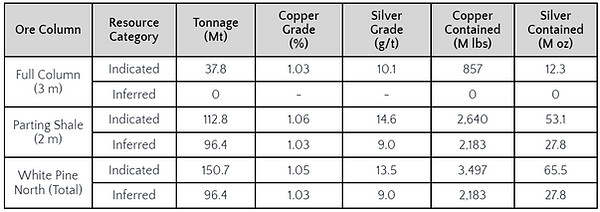
Notes on Mineral Resources:
-
Mineral Resources are reported using a copper price of US$4.00/lb and a silver price of US$25/oz.
-
A payable rate of 96.5% for copper and 90% for silver was assumed.
-
Metallurgical recoveries of 88% for copper and 73.4% for silver were assumed.
-
A cut-off grade of 0.90% copper was used, based on an underground “room and pillar” mining scenario.
-
Mineral Resources are reported within the most probable extraction scenario of Full Column or Parting Shale based on mine engineering.
-
Operating costs are based on a processing plant located at the White Pine site.
-
A flat NSR royalty rate of $0.10/lb Cu payable was applied, which incorporates three royalties on the project (Osisko Silver royalties, Osisko Copper royalties, and Longyear Royalty).
-
Minimum mining thicknesses of 2 m and 3 m were applied to the Parting Shale and the Full Column respectively.
-
No mining dilution and mining loss were considered for the Mineral Resources.
-
Mineralized rock bulk densities is assumed at 2.74 g/cc.
-
Classification of Mineral Resources conforms to CIM definitions.
-
The qualified persons for the estimate are Mr. Réjean Sirois, P.Eng., consultant for GMSI and Mr. Christian Beaulieu, P.Geo., consultant for GMSI. The estimate has an effective date of June 12, 2023.
-
Mineral Resources that are not mineral reserves do not have demonstrated economic viability. The estimate of Mineral Resources may be materially affected by environmental, permitting, legal, title, taxation, sociopolitical, marketing, or other relevant issues.
-
Parting Shale: interval defined from the base of the Lower Transition unit to the top of the Tiger unit.
-
Full Column: interval defined from the base of the Lower Transition unit to the top of the Thinly unit.
-
The quantity and grade of reported Inferred Resources in this estimation are uncertain in nature and there has been insufficient exploration to define these Inferred Resources as Indicated or Measured Mineral Resources.
Mining Plan
The PEA envisions that the deposit will be mined with a mix of conventional highly mechanized, drill and blast and continuous mining room-and-pillar mining method. The method consists of the extraction of a series of entries and cross-cuts in the mineralization, leaving pillars in place to support the back. The entries, cross cuts and pillars have been sized using geotechnical analysis and experience from historical mining at White Pine.
The mine will comprise three sectors; the Eastern, Center and Western parts. The mine will be accessed via a new covered box-cut to establish a portal at the mine entrance from the surface, located at the western side of the deposit. The pre-production period requires 18,193 m of development to establish the main entry panel requiring four to six drifts according to the ventilation requirements. Ground conditions are expected to be good to excellent, similar to the historical White Pine mine. The ground support consists a 1.8 m rebar bolts on a 1.2 m by 1.2 m pattern. At room intersection rebar bolt length is increased to 2.4 m.
The production schedule is based on mining a fixed target of 5.475 M tonnes/year. To achieve this annual production, seven to fourteen production panels must be in production simultaneously. The number of required panels depends on the tonnage from the development as well as the height of the rooms of each panel. The mining of the room will be done using a single-pass approach. In the first pass, larger pillars are left in place. The mining recovery is approximately 57%.
Life-of-Mine (LOM) Metal Production
The LOM production for the White Pine Project is shown below. Payable copper production is estimated at 922,803 tonnes (2,034 million pounds) with an annual average of 42,428 tonnes (93.5 million pounds) over the 23.4-year mine life which includes a 21-month commissioning and ramp-up period. The average copper payable rate is 96.5%. Payable silver production over the LOM is 26.2 million ounces with an annual average of 1,203 thousand ounces of silver.
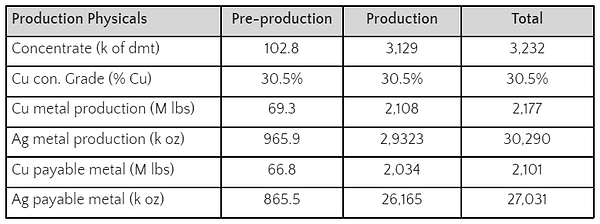
Processing and Metallurgy
The PEA envisions a process plant design for the Project that is based on the historical metallurgical flowsheet to produce copper concentrate with a nominal throughput of 15,000 tpd and a planned availability of 92%. The flowsheet consists of a standard grinding circuit with SAG and Ball Mill in closed circuit with cyclone targeting a primary grind of 105 microns. The cyclone overflow feeds the primary flotation cells following by a desliming cyclone and secondary flotations cells. The concentrate from the primary and secondary flotation cells will be sent to a regrind mill in close circuit with cyclone targeting a grind of 20 microns. The regrind cyclone overflow feeds two stages of concentrate cleaning cells before thickening, filtration concentrate and tailings disposal.
The copper recovery is estimated at 88% with a concentrate grade of 30.5% Cu. Silver recovery is estimated at 73.4%.
Power and Surface Infrastructure
The Company envisions using the available power from the grid in conjunction with a natural gas fired power generation plant to be built on site. The combined power capacity is estimated at 38 MW. The existing tailings disposal facility will be utilized to deposit tailings from the White Pine North project, which will require dam raises over the life-of-mine. Water supply is available from an existing Lake Superior pump station.
Capital and Operating Costs
The initial capital costs, including all direct and indirect costs, are estimated at $880.4 million, including a contingency of $140.4 million. It is anticipated that pre-production revenue of $265.2 million will reduce the capital expenditures to $615.2 million.
Initial Capital Expenditure Summary
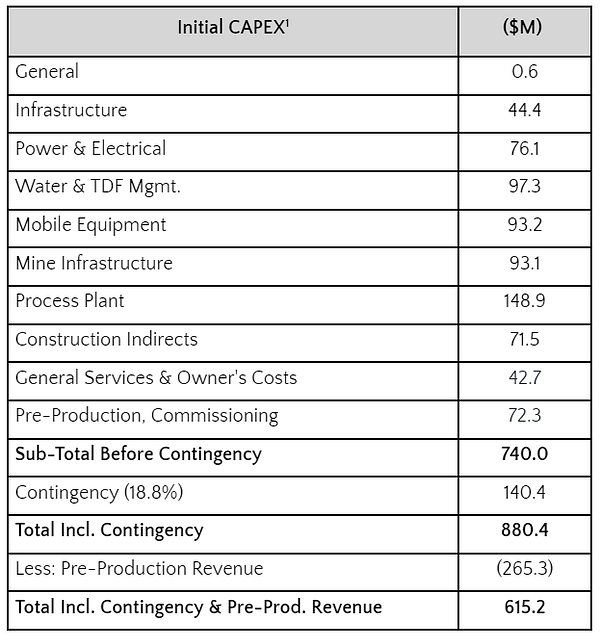
Sustaining Capital Expenditure Summary
The total LOM sustaining capital is estimated at $657.8 million. The sustaining capital includes the extension of the conveyor system for extracting ore to surface and replacement of equipment which typically has a useful life of 50,000 hours.
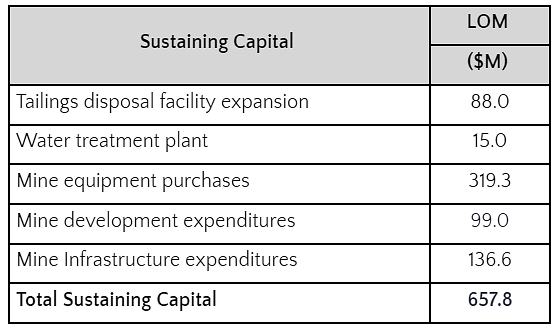
Operating Costs Summary
Operating costs include mining, processing, G&A services, concentrate transportation and concentrate treatment and refining charges. The concentrate transportation, treatment charges and refining are deducted from gross revenues to calculate the net smelter return (“NSR”). The NSR for the Project during operations is estimated at $8.1 billion, excluding $265 million of NSR generated during pre-production and presented as a reduction of initial capital expenditures. The average NSR over the LOM is $3.97 per pound of payable copper. The average operating cost over the LOM is $29.90 per tonne of ore or $1.64 per pound of payable copper with mining representing 58% of the total operating costs, or $17.39 per tonne of ore.
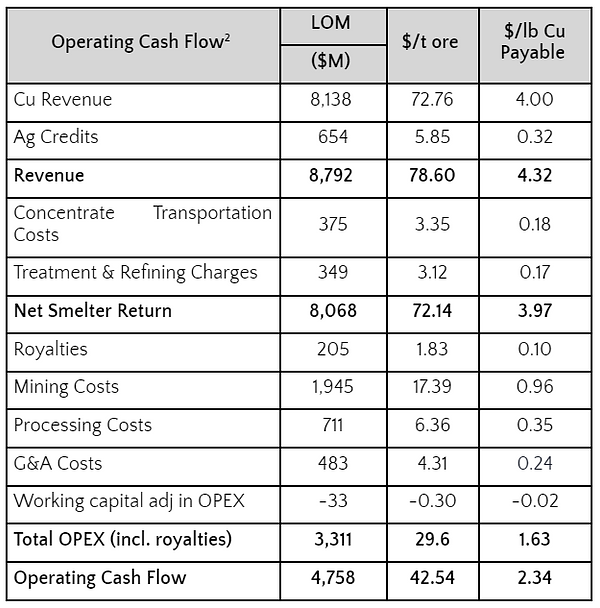
2) Excluding commissioning period.
Sensitivity Analysis
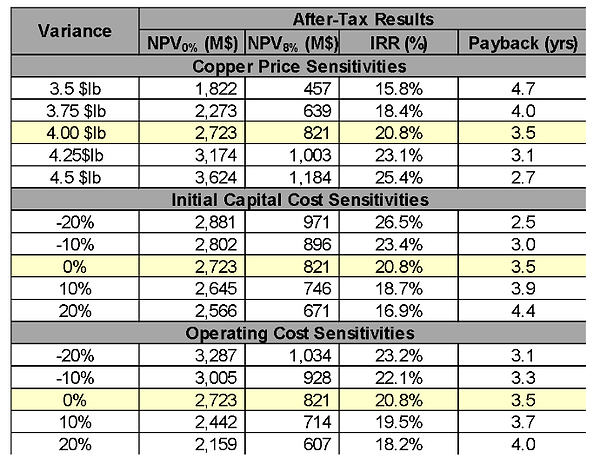
Estimated Timeline
The estimated timeline for the White Pine North Project is shown below. Upon receipt of required permits and necessary approvals a 39-month mine development, construction, commissioning, and pre-production ramp-up period is foreseen followed by 21.75 years of commercial production.
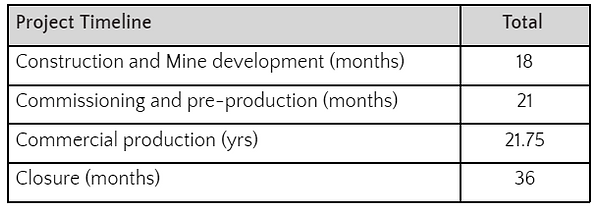
PEA Assumptions
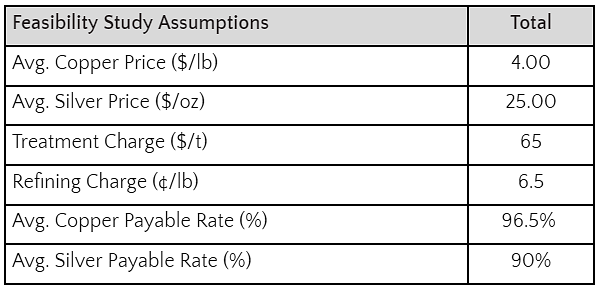
Summary Economics for White Pine Project
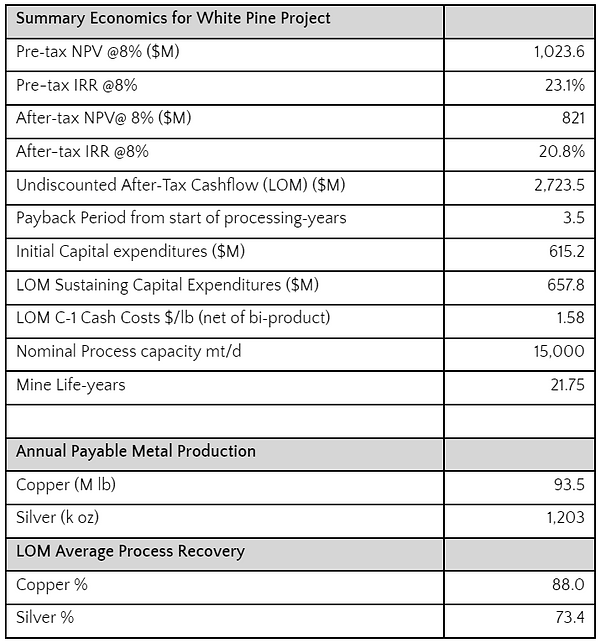
All-in Cash Cost
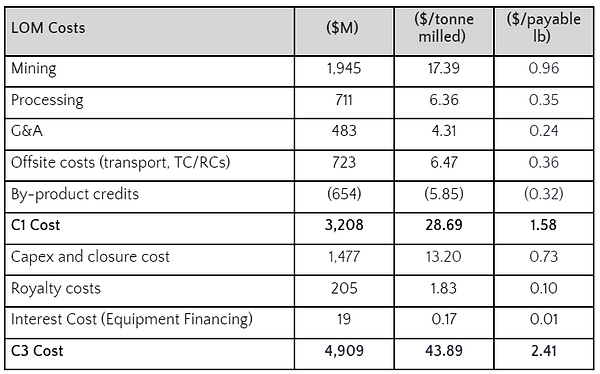
Environment and Permitting
The former White Pine mine has hosted mining activities for over a century and most recent mining activities spanned from the 1950’s to 1995. The site been the subject of an extensive remediation program outlined in judicial Consent Decree and Remedial Action Plan agreements between Copper Range Company, Michigan’s Attorney General, and the Michigan Department of Environment, Great Lakes, and Energy (EGLE). The entire surface area overlying the underground mine along with the associated surface component area and tailings impoundments are listed as a “facility” under Part 201, Environmental Remediation, of Michigan’s Public Act 451 of 1994 as Amended, the Natural Resource and Environmental Protection Act (NREPA). With the completiom of the final closing of the acquisition of the mineral and surface rights from CRC, the Company has assumed all environmental liabilities related to the Consent Decree and on-going environmental obligations, and has been indemnified by White Pine LLC, the owner of the White Pine North project, for such liablities.
The Project considers additional ore extraction and processing on site by modern methods and under current regulations. No federal permits are applicable, however, state (NREPA) permits will be needed, anticipated to include:
-
Part 632 Mining Permit,
-
Part 31 National Pollutant Discharge Elimination System (NPDES)
-
Part 55 Permit to Install (air permit)
-
Part 301/303 Wetlands and Streams
-
Part 315 Dam Safety Permit
The Company had begun baseline environmental surveys with intent to assemble baseline data suitable for obtaining permits. Historical data exists on surface water, ground water and near-surface soils. Updated baseline data collection is underway or being planned, including groundwater, surface water, biological and wetland surveys, archaeological surveys, and other data that support the developing mine plan. The Company anticipates this woek will continue under the joint venture.
Qualified Persons
Carl Michaud, P. Eng., of GMSI, an independent qualified person, as defined under NI 43-101, has read and approved the technical portions of this news release. The following qualified persons will be responsible for the preparation of their relevant portions of the technical report to be prepared in accordance with NI 43-101 and they have reviewed and approved this news release.
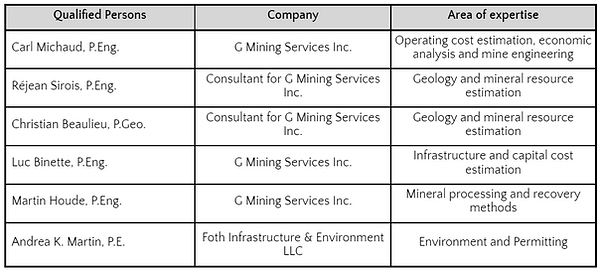
Technical Report
The Company is planning to file a technical report in accordance with NI 43-101 on SEDAR, within 45 days from the date of this news release. Readers are cautioned that the conclusions, projections and estimates set out in this news release are subject to important qualifications, assumptions and exclusions, all of which are detailed in the technical report. To fully understand the summary information set out in this news release, the technical report that will be filed on SEDAR should be read in its entirety.
About The White Pine North Project
The White Pine North Copper Project is located in the historical copper range district of the Upper Peninsula of Michigan, approximately 7.5 km south of Lake Superior in Ontonagon County. The Project covers approximately 4,500 hectares (11,000 acres) of surface rights and approximately 11,990 hectares (29,615 acres) of mineral rights. The former White Pine mine was in production from 1953 through 1995. By the time it closed, over 4.5 billion pounds of copper had been produced from the mine. In July 2021, Highland Copper completed the acquisition of the White Pine north project from Copper Range Company.
About Highland Copper Company
Highland Copper Company Inc. is a Canadian company focused on exploring and developing copper projects in the Upper Peninsula of Michigan, U.S.A. The Company owns the Copperwood deposit through long-term mineral leases and 34% of the White Pine North project. The Company also owns surface rights securing access to the deposit and providing space for infrastructure as required. The Company has 736,363,619 common shares issued and outstanding. Its common shares are listed on the TSX Venture Exchange under the symbol “HI” and trade on the OTCQB Venture Market under symbol “HDRSF”.
More information about the Company is available on the Company’s website at www.highlandcopper.com and on SEDAR at www.sedar.com.
About Kinterra
Kinterra Capital is a private equity firm investing in the people, ideas, critical minerals, and strategic infrastructure necessary to accelerate the energy transition. Kinterra leverages significant domain specific technical and transactional expertise to source and manage investments that create value for key stakeholders, all while enhancing the communities within which we operate through meaningful partnerships. At Kinterra, the focus is on innovative ideation, rigorous analysis and executing with excellence to make investments that will create a more sustainable future. For more information about Kinterra Capital, visit www.kinterracapital.com.Cautionary Note REGARDING FORWARD-LOOKING INFORMATION
This press release contains certain “forward-looking information within the meaning of applicable Canadian securities legislation. These forward-looking statements are made as of the date of this news release and Highland Copper Company Inc. does not intend, and does not assume any obligation, to update these forward-looking information, except as required under applicable securities legislation. Forward-looking information relate to future events or future performance and reflect Company management’s expectations or beliefs regarding future events and include, but are not limited to, information with respect to the estimation of mineral resources, the conversion of mineral resources to mineral reserves, the expected timing for completion of additional studies and exploration and development work through to the commencement of construction of the White Pine mine, Highland’s ability to raise the necessary debt and equity contribution to the project, the realization of mineral resource estimates, the timing and amount of estimated future production, costs of production, capital expenditures, success of mining operations, life of mine, environmental risks, the timing of the receipt of permits, the timing and terms of a power purchase agreement, unanticipated reclamation expenses, title disputes or claims and limitations on insurance coverage, including expectations with respect to Kinterra, the new majority owner of the White Pine LLC, to advance the project as provided herein. In certain cases, forward-looking information can be identified by the use of words such as “plans”, “expects” or “does not expect”, “is expected”, “outlook”, “budget”, “scheduled”, “estimates”, “forecasts”, “intends”, “anticipates” or “does not anticipate”, or “believes”, or variations of such words and phrases or information that certain actions, events or results “may”, “could”, “would”, “might” or “will be taken”, “occur” or “be achieved” or the negative of these terms or comparable terminology. In this document certain forward-looking information are identified by words including “scheduled”, “plan”, “planned”, “estimated”, “projections”, “projected” and “expected”. Forward-looking information are based on a number of assumptions which may prove incorrect, including, but not limited to, the include the specific assumptions set out in this press release and in the Report, that future capital and operating costs will be in line with Highland’s assumptions, that mineral resource estimates prove accurate, permits required to commence production will be obtained on a timely basis, mineral and metals prices will remain consistent with Highlands expectations, that there are no changes in the development plans for White Pine as new information is received, that Highland will be able to access financing, equipment to meet its contribution obligations, and that sufficient qualified labor to carry out the development plans. By their very nature forward-looking information involves known and unknown risks, uncertainties and other factors which may cause the actual results, performance or achievements of the Company to be materially different from any future results, performance or achievements expressed or implied by the forward-looking information. Such factors include, among others, changes in project parameters as plans continue to be refined; fluctuations in the currency markets; fluctuations in the spot and forward price of minerals; volatility in the price of fuel and electricity; changes in national and local government legislation, taxation, controls, regulations and political or economic developments in Canada and the USA; operating or technical difficulties in connection with mining or development activities; employee relations; litigation; the speculative nature of underground mine exploration and development, including the risks of obtaining necessary licenses and permits; contests over title to properties, particularly title to undeveloped properties; failure of processing and mining equipment to perform as expected; labor disputes; supply problems; uncertainty of production and cost estimates; the interpretation of drill results; the assumptions upon which the estimation of mineral resources prove inaccurate, which could lead to a restatement of resources;; changes in project parameters as plans continue to be refined; possible variations in mineral resources, grade of mineralization or recovery rates may differ from what is indicated and the difference may be material; legal and regulatory proceedings and community actions; accidents, title matters; regulatory restrictions; permitting and licensing; volatility of the market price of Common Shares; insurance; competition; and hedging activities. In addition, there are risks and hazards associated with the business of exploration, development and mining, including environmental hazards, industrial accidents, unusual or unexpected formations, pressures, cave – ins, flooding and the risk of inadequate insurance, or inability to obtain insurance, to cover these risks.
Cautionary Note to United States Investors
Highland advises U.S. investors that this press release contains the terms “inferred”, “indicated” and “measured” resources. All resource estimates have been prepared in accordance with NI 43-101. NI 43-101 is a rule developed by the Canadian Securities Administrators which establishes standards for all public disclosure an issuer makes of scientific and technical information concerning mineral projects. Canadian standards differ significantly from the requirements of the United States Securities and Exchange Commission (“SEC”), and resource information contained therein may not be comparable to similar information disclosed by U.S. companies. In particular, and without limiting the generality of the foregoing, the term “resource” does not equate to the term “reserves”. “Inferred resources” have a great amount of uncertainty as to their existence, and great uncertainty as to their economic and legal feasibility. It cannot be assumed that all or any part of an “inferred resource” will ever be upgraded to a higher category. U.S. investors are cautioned not to assume that all or part of an inferred resource exists, or is economically or legally mineable. U.S. Investors are also cautioned not to assume that all or any part of mineral deposits in the “measured” or “indicated” resource categories will ever be converted into reserves.
Neither the TSX Venture Exchange nor its Regulation Services Provider (as that term is defined in the policies of the TSX Venture Exchange) accepts responsibility for the adequacy or accuracy of this release.
For further information, please contact:
Denis Miville-Deschênes, President & CEO
Email: info@highlandcopper.com
Website: www.highlandcopper.com